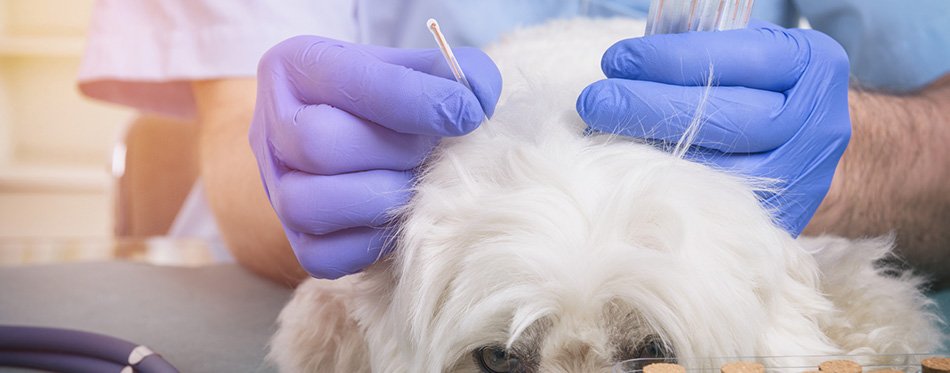Acupuncture is an ancient holistic treatment method that has been used for centuries to aid the human body in healing itself. Written evidence of the use of acupuncture has been found going back as far as 1000BC. The treatment uses very fine needles to redirect and rebalance energy flow throughout the body. It has been shown to be so successful that it is now often incorporated into more mainstream treatment methods for a range of medical issues from pain and inflammation to supporting recovery from injury, surgery, and illness.
While its use in humans is widespread, its use with animals is still a cause for debate. Can animals, and dogs in particular, really benefit from acupuncture? If so, what are its advantages and what ailments can it best be used to combat? Here we look at these questions in more detail and answer whether acupuncture for dogs can really work.

What is Acupuncture for Dogs?
Acupuncture for dogs works along the same principles as it does for humans, applying the principles of ancient Chinese medicine. The basis of ancient Chinese medicine is that imbalances in the vital energies of the body are the root cause of illness. Acupuncture sets out to restore these balances allowing the body to heal itself. It works through the insertion of very fine needles at specific points in your dog’s body. These points are known as meridians and are points where blood vessels and nerves converge. The needles guide the energy, known as chi, to where it is needed or away from where it is not required. The needles also help to stimulate the nervous system of your pet pooch and encourage the release of substances that have pain-relieving and anti-inflammatory properties.
How Does Acupuncture Help?
Even without subscribing to the beliefs that underpin acupuncture, such as the existence of chi, it is possible to see the process as beneficial. Inserting acupuncture needles into specific points improves your pet’s blood flow. This, in turn, increases the oxygenation of the tissues, reduces the amount of waste products that are produced by the body, and increases the amount of metabolic waste that can be removed by the body.
Muscle relaxation is another benefit of acupuncture, and it is not just the muscles where the needles are inserted that benefit. Muscles across the body relax during and after acupuncture sessions. This provides both local and more generalized pain relief for your dog. This benefit is further enhanced by the release of anti-inflammatory and pain-relieving substances that occur naturally in the body. As a result, your pet pooch may require less pain medication. While properly prescribed pain medication is safe for your pet, over time, there can be a cumulative effect on the organs. As a consequence, your dog may have to undergo regular screening and testing to ensure there is no damage to the organs and that they continue to function effectively. Such testing can be unsettling for your pet and cause increased anxiety. You are reducing anxiety by removing the need for regular testing, and this benefits both you and your dog.
Are There Any Side Effects to Acupuncture?
Acupuncture has no side effects and causes no harm to your pet. Some dogs do experience stiffness or soreness immediately after treatment, and most are tired following acupuncture sessions. These effects are not long-lasting and usually disappear within a day or two. However, it must be carried out by a properly trained veterinarian who understands the principles of acupuncture and the correct points in which to insert the needles. Acupuncture by itself may not cure illness, but it can be used safely and effectively alongside medical treatments and therapies to improve outcomes. It may also alleviate some, if not all, of the side effects of harsher treatments that may be required for some illnesses and longer-term conditions that dogs can suffer.
What Conditions Can Acupuncture Help with?
Acupuncture can help to relieve a wide range of conditions that cause pain and inflammation in dogs, particularly muscular-skeletal conditions, hip dysplasia, and arthritis. It can also help to alleviate the side effects of treatments for illnesses such as cancer. Acupuncture for dogs has been shown to be effective at reducing the side effects of radiation and chemotherapy, especially decreased appetite, nausea, and tissue inflammation. Other illnesses and conditions that may react well to acupuncture, especially alongside other medical treatments include:
- Cushing’s disease
- Diabetes
- Liver failure
- Kidney disease
- Pancreatitis
- Addison’s disease
Although there is no firm evidence that acupuncture can cure diseases such as Addison’s and Cushing’s, it can make the conditions more comfortable for your pet to live with, making their time with you more enjoyable and less painful.
What Should you Expect From an Acupuncture Session?
Dog acupuncture must be carried out by a trained and qualified veterinary acupuncturist. Before agreeing to consider this course of treatment, you should check that your veterinarian has the required skills and training. Your first acupuncture appointment should involve a general medical assessment, and the veterinary acupuncturist should have access to and have read your dog’s medical notes and history. This should include any recent blood tests, scans, or other the results of any other procedures your dog has had. They should also know about any medication, treatment, therapies your dog is currently undertaking or has previously tried.
As well as discussing your dog’s medical history, the veterinarian will undertake their own examination of your pet and discuss their condition and treatment options with you. They will then explain what will happen during the session and what you can expect from the sessions.
Acupuncture sessions usually last between 20 and 30 minutes, although the first may be longer. While your dog may be nervous to begin with, they should start to relax once the needles are inserted. Treatment length may vary as may the frequency of sessions, depending on the condition being treated and its severity. It is not uncommon for treatment to take place up to three times a week to begin with and then for sessions to reduce in frequency as your dog shows improvement. It is usual for your pet pooch to be tired after an acupuncture session, and some dogs exhibit some stiffness or soreness; these effects usually dissipate within 48hours. If you have any concerns, you should discuss them with the veterinary acupuncturist.

What are the Key Acupuncture Points for Dogs?
There are 14 different meridians that relate to the flow of chi or energy through your dog’s body. The 14 meridians are:
- Lung
- Large intestine
- Stomach
- Spleen
- Heart
- Small intestine
- Bladder
- Kidney
- Pericardium
- Triple heater
- Gallbladder
- Liver
- Governing vessel
- Conception vessel
There are several different dog acupuncture points that relate to each meridian. For example, for the lung meridian, there are five acupuncture points:
- LU1: The alarm point – the pectoral muscle at the level of the first intercostal space, medial to the greater tubercle of the humerus
- LU5: The Sea point – on the transverse cubital crease, on the lateral side of the bicep brachii tendon when the elbow is flexed
- LU7: The Master Point of the head/neck/lungs – on the medial end of the transverse crease of the carpus, on the medial side of the radial artery
- LU9: Influential Point of the Vessels – on the medial end of the transverse crease of the carpus, on the medial side of the radial artery
Of course, for most dog parents, most of the terms will mean very little. If you want to understand better where and why your veterinary acupuncturist is placing the needles in your dog, ask them to explain as they work or to show you on a simple chart. In total, there are over 100 different points that your acupuncturist may use to help realign your dog’s energy flow. Not all these points will be used at any one time, and the points that are used may change during treatment depending on how your dog responds and the nature of the illness and the symptoms.
Does Acupuncture Work for Dogs?
The short answer is yes, acupuncture works for dogs. As long as it is carried out by a professional veterinary acupuncturist, it is a safe and effective treatment for a range of conditions and can help to alleviate the symptoms of many others as well as the side effects of some medical procedures and drugs.
It is essential to seek out a qualified and experienced practitioner and to work with your regular veterinarian to ensure that the course you are taking is the best course of action for your pet. It also ensures that everyone is working together towards the cam goals.
Source:
- Veterinary Acupuncture – Washington State University

